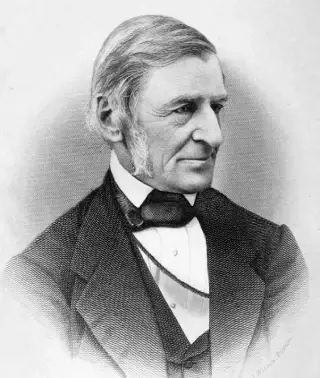Biography of Ralph Waldo Emerson

| date | place | |
|---|---|---|
| born | May 25, 1803 | Boston, Massachusetts |
| died | April 27, 1882 | Concord, Massachusetts |
Ralph Waldo Emerson was a prominent American poet, essayist, philosopher, and lecturer who played a key role in the Transcendentalist movement of the 19th century. Born in Boston to a Unitarian minister, Emerson faced early loss with his father's death and was raised largely by his aunt, Mary Moody Emerson, who influenced his intellectual development. Emerson attended Harvard College at the age of 14 and graduated in 1821. He briefly taught school before entering Harvard Divinity School, where he was ordained as a Unitarian minister in 1829. However, after the death of his first wife, Ellen Tucker, in 1831 and a subsequent crisis of faith, he resigned from the ministry. In 1832, Ralph Waldo Emerson traveled to Europe, where he met influential thinkers like Thomas Carlyle and Samuel Taylor Coleridge. This exposure helped shape his philosophical outlook. Upon returning to America, he became a leading voice for Transcendentalism, which emphasized individual intuition and the inherent goodness of people and nature. His seminal essay "Nature," published in 1836, laid the groundwork for this philosophy. Emerson's writings include notable essays such as "Self-Reliance" and "The American Scholar," which advocate for self-discovery and originality in thought. He edited The Dial, a key Transcendentalist journal, and published several volumes of essays throughout the 1840s. His works often explored themes of individuality, spirituality, and the relationship between humanity and nature. In his later years, Emerson continued to write and lecture despite declining health. He became known as the "Sage of Concord" and remained active until his death from pneumonia in 1882. His ideas profoundly influenced American literature and thought, impacting contemporaries like Henry David Thoreau and Walt Whitman. Emerson's legacy endures as a pivotal figure in American philosophy and literature, championing ideals of individualism and critical thinking. Ralph Waldo Emerson's poetry is a profound reflection of his philosophical beliefs, particularly those rooted in Transcendentalism. His poems often celebrate the beauty and power of nature, emphasizing the deep connection between the individual and the natural world. Works such as "The Snow-Storm" and "Concord Hymn" exemplify his ability to capture nature's majesty while exploring themes of individuality and spiritual transcendence. In "The Snow-Storm," Emerson personifies the storm as an artist, illustrating how nature transforms the landscape into a breathtaking spectacle. This vivid imagery not only highlights his appreciation for the natural world but also serves as a metaphor for the creative process itself, underscoring his belief that nature is a source of inspiration and insight. Despite being primarily recognized for his essays, Emerson's poetry has gained significant importance in American literature, with many of his works becoming essential reading in schools and universities. His collection Poems, published in 1847, includes notable pieces like "Brahma" and "The Rhodora," which delve into spiritual inquiries and the interconnectedness of all life. Emerson's innovative approach to form and content paved the way for future American poets, influencing figures like Walt Whitman and Emily Dickinson. His exploration of themes such as self-reliance, individuality, and the divine within nature continues to resonate with readers today, solidifying his legacy as one of America's most significant poetic voices.
Feel free to be first to leave comment.